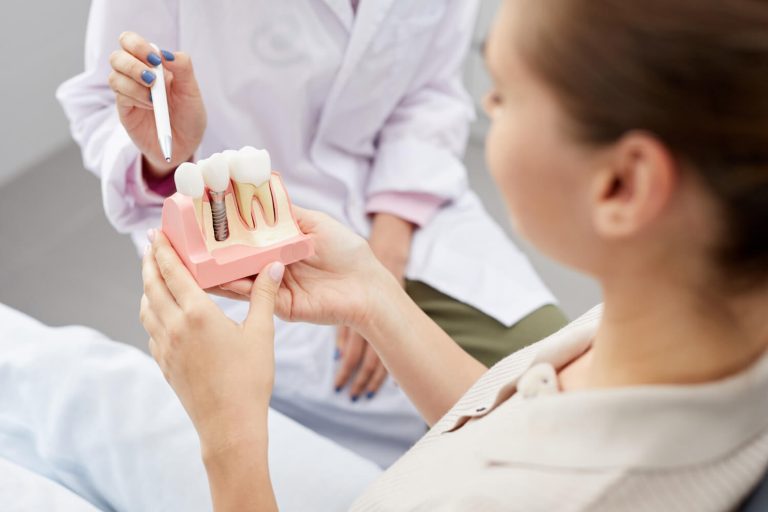In DENTISTRY,a dental crown is basically a tooths-shaped cap or cover that is specially made and fixed to your tooth.These crowns helps your teeth to function better. Dental surgeons use these crowns to restore weak or decayed tooth. These custom-made coverings are designed to fit over a damaged or weakened tooth, restoring its strength and appearance. But when exactly are dental crowns necessary?
In this complete guide, we will investigate the various scenarios in which dental crowns become a vital part of dental treatment.
1. Understanding Dental Crowns
- What Are Dental Crowns?
- Types of Dental Crowns
- When Are Dental Crowns Used?
2. Common Reasons for Dental Crowns
- Tooth Decay and Large Fillings
- Cracked Teeth
- Root Canal Therapy
- Cosmetic Enhancement
- Dental Implants
- Tooth Wear
- Gum problems
3. The Dental Crown Procedure
- Diagnosis and Treatment Planning
- Tooth Preparation
- Temporary Crowns
- Placement of Permanent Crowns
- Post-Placement Care
4. Choosing the Right Dental Crown
- Materials Used in Dental Crowns
- Factors Affecting Crown Selection
- Discussing Options with Your Dentist
What Are Dental Crowns?
Dental crowns are protective caps that are custom-made to fit over a tooth. They encase the entire visible portion of the tooth above the gumline, providing strength and protection. Crowns are typically made from various materials, including porcelain, metal, or a combination of both. Their main function is to restore the structural integrity of a damaged tooth while preserving its appearance.
Types of Dental Crowns
There are several types of dental crowns, each with its unique advantages :
Porcelain Crowns: These crowns are known for their natural appearance, making them a popular choice for front teeth. These are the most common dental crown material.
Metal Crowns: Metal crowns, often made from alloys like gold or nickel, are extremely durable and are commonly used for the back teeth( molars). They are known for their longevity.
Porcelain-Fused-to-Metal (PFM) Crowns: PFM crowns combine the strength of metal with the natural appearance of porcelain. They are recommended for both front and back teeth.
All-Ceramic Crowns: These crowns are completely made of ceramic material. They are often used for highly visible teeth.
Temporary Crowns: These crowns are used as a short-term solution while awaiting the creation of a permanent crown. They provide protection until the final crown is ready.
When Are Dental Crowns Used?
Dental crowns are used in a variety of issues where a tooth requires additional support or restoration.
Tooth decay
A dental crown becomes necessary, when tooth decay reaches to that point where a filling is not sufficient. Crowns can provide structural integrity to the tooth and protect it from further decay.
Cracked Teeth
Dental crowns are even beneficial for those teeth which are cracked or have become weak due to any injury. The crown serves as a protective shell, holding the tooth together and preventing them from further damage.
Root Canal Therapy
A dental crown is often placed over the treated tooth to strengthen it after going through a treatment of root canal.
Cosmetic Enhancement
Dental crowns are not only helpful in repairing tooth but they are used for cosmetic dentistry. They can be used to improve the appearance of teeth that are discolored. In particular, PORCELAIN CROWNS are known for their ability to create a natural smile.
Dental Implants
Dental implants are surgically placed in your jawbones to restore our ability to chew. These are artificial tooth roots used to replace missing teeth. A dental crown is placed on top of the implant to mimic the function of a natural tooth.
Teeth can become worn down over time due to factors like teeth grinding. Dental crowns can help rebuild these damaged teeth, restoring their function.
Diagnosis and Treatment Planning
The process of getting a dental crown begins with a thorough examination by your dentist. They will examine the condition of your tooth and discuss your symptoms.
Tooth Preparation, Your tooth needs to be prepared,before placing a crown. Your dentist will ensure that the tooth is properly prepared to support the crown.
Placement of Permanent Crowns
The permanent crown is typically fabricated in a dental laboratory, which may take a couple of weeks. Once the crown is ready, you will return to the dental office for its placement.
After receiving your dental crown, it’s necessary to follow proper oral care practices to ensure its longevity.
Materials Used in Dental Crowns
The choice of crown material depends on various factors, including the location of the tooth and budget too. Porcelain Crowns crowns provide an excellent blend of aesthetics and strength, making them suitable for front teeth. They are custom-matched to your natural tooth color.
Metal Crowns: Metal crowns, typically made from alloys like gold or silver, are exceptionally durable.
The cost of dental crowns can vary mainly based on the material used. Your dentist will play a crucial role in helping you choose the right dental crown.
Brush your teeth at least twice a day. Floss daily to remove food particles from between your teeth and around the crown.
While dental crowns are durable and long-lasting, complications can arise if proper care is not taken.
Dental crowns are a versatile and effective solution for various dental issues.

